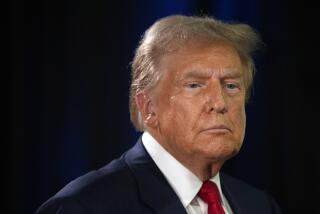Judge Drops 3 Parts of Deaver Indictment : Prosecutor Admits Insufficient Evidence; Other Counts Remain
- Share via
WASHINGTON — Attorneys for former presidential aide Michael K. Deaver got a boost in federal court Tuesday when the trial judge approved a move to eliminate three unproven parts of one perjury count against Deaver.
Court-appointed prosecutor Whitney North Seymour Jr. initiated the action, acknowledging that there was insufficient evidence to proceed with the charges. But Judge Thomas Penfield Jackson, while paring down charges involving Deaver’s lobbying for Canada, allowed the rest of the comprehensive five-count indictment to stand, at least for now.
The court action kept the six-week-long case on track for submission to the jury late this week, probably Friday. Seymour is scheduled to begin a long summation of evidence to the jury Thursday. That will be followed by a closing statement from Deaver’s lawyers, who announced Monday that they were resting their case without calling any witnesses.
Legal Instructions
After the closing statements, Jackson must give legal instructions to the jury. At a hearing today, the judge will hear suggestions by attorneys for both sides on what those instructions should be.
A key section of Deaver’s indictment that was deleted Tuesday dealt with a New York luncheon meeting that Deaver allegedly had with Allan E. Gotlieb, the Canadian ambassador to the United States, in January, 1985.
At that time, Deaver was serving his final months as deputy White House chief of staff and was overseeing plans for a March 17, 1985, summit meeting in Ottawa between President Reagan and Canadian Prime Minister Brian Mulroney.
Because Deaver began representing Canada as a Washington lobbyist within days of his resignation from the White House on May 10, 1985, a federal grand jury that investigated his activities last year sought to learn if he had discussed that arrangement while still with the government, a possible law violation.
Could Not Recall
In response to a series of grand jury questions, Deaver said he did not recall meeting with Gotlieb. He was subsequently charged with perjury for those answers.
Seymour had planned to subpoena Gotlieb to testify about the luncheon meeting and thus support that element of perjury. But Gotlieb refused to appear, contending that his diplomatic immunity shields him from a U.S. court summons. He was supported by the State and Justice departments.
Jackson refused to enforce the subpoena, leaving Seymour without proof of that particular perjury charge.
Date in Question
In addition, Deaver was charged with lying for contending that he did not recall a March 2, 1985, meeting with then-White House aides Donald T. Regan and Robert C. McFarlane to plan the U.S.-Canadian summit. Trial testimony, however, showed that the date was probably in error, causing this part of the indictment to be deleted.
Thirdly, three other dates on which Deaver allegedly discussed the Canadian acid rain problem while in government were shown to be possibly erroneous. This section of the charges also was dropped.
The three deletions were not sufficient for Jackson to throw out the entire count because that section of the indictment also accuses Deaver of falsely denying other meetings, including one with Secretary of State George P. Shultz, which were proven by testimony. But the deletions were seen by defense attorneys as weakening at least one perjury count.
Other Contacts
Herbert J. Miller Jr., Deaver’s principal attorney, also had asked the judge to throw out charges that Deaver lied about alleged contacts with four Administration officials who never took the witness stand to verify the contacts.
But Jackson reserved ruling on these motions, as well as on other sections of the indictment. He gave no indication whether he would rule before the case reaches the jury.
Miller told Jackson that if he permitted the indictment to go to the jury without further deletions, “that would be error, in my opinion,” and thus grounds for appealing any conviction that might result.
More to Read
Sign up for Essential California
The most important California stories and recommendations in your inbox every morning.
You may occasionally receive promotional content from the Los Angeles Times.










